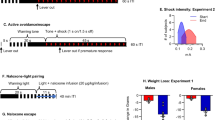Abstract
The effects of subcutaneous adrenaline administration on preference for ethanol (2.5% solution) have been investigated, using a two-bottle choice situation. Administration of the amine (50 μg/kg) immediately after the conditioning session significantly attenuated ethanol preference. Adrenaline treatment (10, 50 or 100 μg/kg) prior to the first retention test induced a significant reduction in ethanol preference. When the amine was injected prior to conditioning only the dose of 100 μg/kg reduced later ethanol preference. Our results indicate that systemically administered adrenaline impairs the acquisition of preference to a weak ethanol solution. It is suggested that this effect of the amine may be linked to interference with consolidation of memory and retrieval processes.
Similar content being viewed by others
References
Berkenbosch F, Vermes I, Binnekade R, Tilders FJH (1981) Beta-adrenergic stimulation induces an increase of plasma levels of immunoreactive α-MSH, β-endorphin, ACTH and of corticosterone. Life Sci 29:2249–2256
Bohus B, Koolhaas JM (1985) Neuropeptides, neurotransmitters, and memory: sociosexual aspects. In: McGaugh JL (ed) Contemporary psychology: Biological processes and theoretical issues. Elsevier. Amsterdam, pp 3–16
Borrell J, de Kloet ER, Versteeg DHG, Bohus B (1983a) Inhibitory avoidance deficit following short-term adrenalectomy in the rat: The role of adrenal catecholamines. Behav Neural Biol 39:241–258
Borrell J, de Kloet ER, Versteeg DHG, Bohus B (1983b) The role of adrenomedullary catecholamines in the modulation of memory by vasopressin. In: Endroczi D, de Wied D, Angelucci L, Scapagnini U (eds). Integrative neurohumoral mechanism. Elsevier, Amsterdam, pp 85–90
Borrell J, del Cerro S, Guaza C, Zubiaur M, de Wied D, Bohus B (1985) Interactions between adrenaline and neuropeptides on modulation of memory processes. In McGaugh JL (eds) Contemporary psychology: biological processes, and theoretical issues. Elsevier, Amsterdam pp 17–35
Caza PA, Brown L, Spear NE (1982) Epinephrine-induced conditioned taste aversion. Behav Neural Biol 35:31–44
Erikson K (1969) Factors affecting voluntary alcohol consumption in the albino rat. Ann Zool Fennie 6:227–265
Gold PE, van Buskirk R (1975) Facilitation of time-dependent memory processes with post-trial epinephrine injections. Behav Biol 13:145–153
Gold PE, van Buskirk R (1978) Post-training brain norepinephrine concentrations: Correlation with retention performance of avoidance training and with peripheral epinephrine modulation of memory processing. Behav Biol 23:509–520
Gold PE, Zornetzer SF (1983) The Mnemon and its juices: Neuromodulation of memory processes. Behav Neural Biol 38:151–189
Greenshaw AJ, Buresova O (1982) Learned taste aversion to saccharin following intraventricular or intraperitoneal administration of d,1-amphetamine. Pharmacol Biochem Behav 17:1129–1133
Grote Jr FW, Brown RT (1971) Conditioned taste aversions; two stimulus tests are more sensitive than one stimulus test. Behav Meth Instrum 3:311–312
Heise GA (1981) Learning and memory facilitators: experimental definition and current status. TIPS 2:158–160
Izquierdo I, Dias RD (1983) Memory as a state dependent phenomenon: Role of ACTH and epinephrine. Behav Neural Biol 38:144–149
de Kloet R, de Wied D (1980) The brain as target tissue for hormones of pituitary origin: Behavioral and Biochemical Studies. In: Martini L, Ganong WF, Frontiers in neuroendocrinology, Vol 6. Raven Press, New York, pp 157–201
Logue AW (1979) Taste aversion and the generality of the laws of learning. Psychol Bull 86:276–296
McGaugh JL (1983) Hormonal influences on memory storage. J Am Psychol Assoc 38:161–174
Myers RD (1963) Alcohol consumption valid measurement in albino rats. Science 161:76–77
Sokal RR, Rohlf FJ (1969) In: Sokal RR, Rohlf FJ (eds) Biometry, WH Freeman and Company, San Francisco
Author information
Authors and Affiliations
Rights and permissions
About this article
Cite this article
Guaza, C., Borrell, S. & Borrell, J. Effects of adrenaline on the acquisition and maintenance of ethanol preference in a taste conditioning paradigm. Psychopharmacology 90, 336–340 (1986). https://doi.org/10.1007/BF00179187
Received:
Revised:
Issue Date:
DOI: https://doi.org/10.1007/BF00179187




